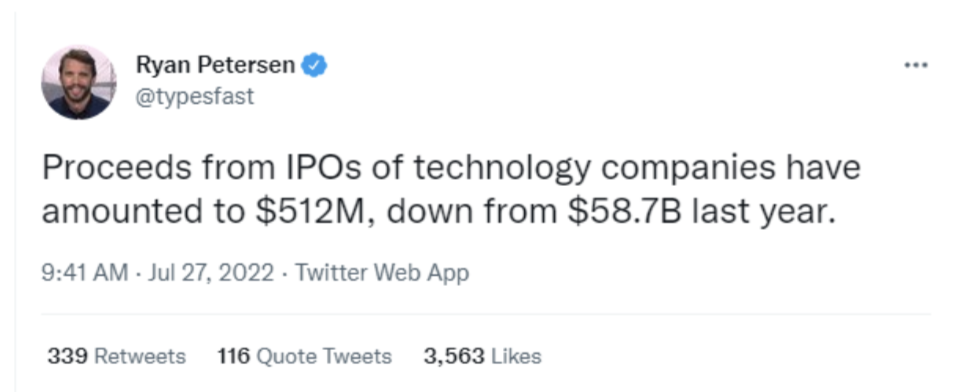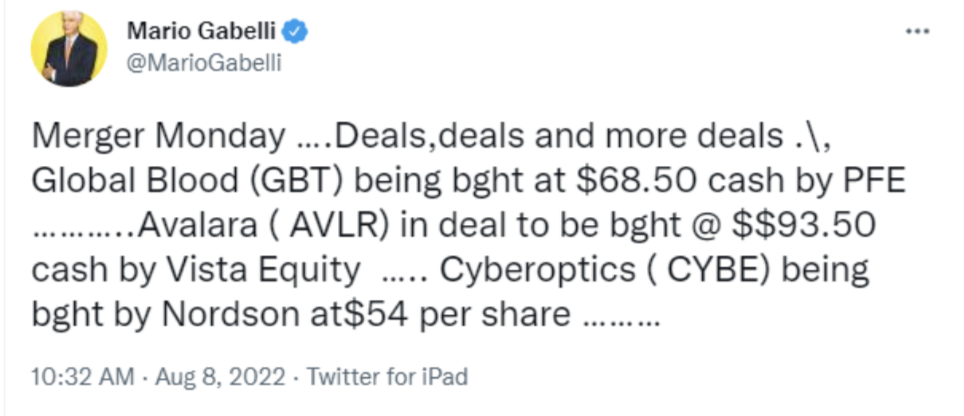Subscribe to Our Investment Banking Mailing List
The financial markets are on everyone’s minds these days, and this certainly includes the uber market sensitive investment banks. That’s why Part I of our two-part series on the investment banking landscape in the current economic climate focuses on the capital markets segment and thoughts that investment bankers are having herein.
This article sets the table for Part II to be released in Q4, and will tackle subjects in Travillian’s wheelhouse, such as, hiring, retention, and compensation.
We’re noticing a distinct shift in all these “human capital” related topics, and we will tackle each in some detail.
The Current Climate and Investment Bank Executive Mindset
Travillian spoke with executives at several investments banks — including Alex Alden at full-service investment bank BTIG, Andrew Schmucker and Patrick Dolan at Conshohocken, Penn.-based investment bank Delancey Street Partners, and David Kimmel at insurance and insurtech-focused M&A advisory firm Insurance Advisory Partners (IAP) — to get a feel for how nimbly the industry has responded to the current economic climate.
We received not only a glimpse into what is happening inside the capital markets and M&A advisory but also the thinking of top management as well as the morale among MD and junior bankers within these and other firms. While most eventually conceded that times are challenging, investment bankers are resilient and are responding to the market environment, working the hand they’ve been dealt in 2022.
It’s also safe to say investment bankers are getting whiplash in the current capital markets environment after a booming 2021. Many of them went from an opulence of deal flow thanks to pent-up demand in the wake of the pandemic to what for many resembles an abrupt stop. The pandemic might be in the rear-view mirror, but investment bankers have been hit with a perfect storm of rising interest rates, historic inflation, and a recessionary environment, all of which have created a sea of uncertainty in the capital markets.
However, investment bankers who might have taken a hit won’t be knocked out easily. There are many more rounds to go in this fight, and more seasoned bankers seem to already know how this market cycle will end.
Travillian Managing Partner David Yancoskie has observed inherent peaks and troughs in the market while investment bankers keep their chin up until the odds shift in their favor.
“So far this year, the investment bankers with whom I’m speaking are definitely not pushing the panic button. The capital markets are soft for sure, but M&A conversations remain brisk, even if deals aren’t getting done at the pace they’d prefer.” Dave continued, “Many earned more money in 2021 than in any other year, and despite a sizeable drop in earnings this year, their employers are still on solid financial footing, so optimism endures.”
So far in 2022, the capital markets are a mixed bag overall. On the Equity Capital Markets (ECM) side, deal flow is down sharply compared to year-ago levels, when issuance was booming. Alex Alden, BTIG Managing Director and Head of Financial Institutions and Financial Technology, described nearly all of ECM activity as having “slowed down to a crawl.”

The data proves this out. To date this year, the sheer number of equity deals in the United States and Canada has fallen off a cliff, hovering at 346 in July compared with 523 transactions in the year-ago period, according to S&P Global. It’s no secret IPOs have come to a screeching halt, a trend that has been exacerbated by greater uncertainty as the year has unfolded.
Proceeds from tech-focused new listings, in particular, are a drop in the bucket compared to year-ago levels, plummeting from $58.7 billion in 2021 to $512 million as of July 2022, according to Ryan Peterson, CEO of San Francisco-based supply chain company Flexport, which despite social media scuttlebutt to the contrary has reportedly opted to remain in the private sector, at least for now, in what Ryan described as this “crazy market environment.”
A decline in issuance on the Debt Capital Markets (DCM) side has been less severe, with 230 deals in July 2022 vs. 275 in the same month a year ago across the United States and Canada. However, pricing has been a challenge due to the dramatic rise in interest rates, which has outpaced even the most hawkish of predictions. We will discuss this dynamic in more detail below.
M&A has been holding steady so far in 2022 despite a cooldown vs. year-ago levels. The number of announced or completed deals in the U.S. and Canada hovered at 1,549 in July 2022 vs. 2,200 in the corresponding month a year ago. A couple of this year’s blockbuster deals have been Amazon’s acquisition of One Medical and Microsoft scooping up Activision Blizzard for $69 billion, paving the way for a nice payday for firms like Goldman Sachs and others.

And as Andrew Schmucker, Managing Partner at Delancey Street Partners, pointed out, corporate America’s balance sheets remain strong, which bodes well for the investment banking community as a whole.
“Companies in the S&P 500 are sitting on $400 billion in cash on their balance sheets. And if that gets deployed, those companies get rewarded,” Andrew said, referring to their stock prices.
These bright spots are serving as silver linings in an environment otherwise plagued by uncertainty. As green shoots begin to emerge, famous value investor Mario Gabelli has declared a return to Merger Monday, characterizing one busy August day as “deals, deals, and more deals.”
While investment bankers and the banks that employ them are concerned about how the rest of the year shakes out, particularly in the ECM, with predictions for it to be tough, there is good news. Emotions have not risen to the level of outright fear as Travillian’s Dave alluded to and as was the case during the 2008-2009 financial crisis. And with 2023 right around the corner, many bankers are seemingly choosing to see the glass half full.

“There’s a great deal of optimism for 2023 because [bankers know] there are ebbs and flows. A lot of companies that wanted to go public this year are holding off. People think valuations will go up, maybe not in the first quarter but maybe in Q2 or Q3 2023. So, there’s some optimism,” said Travillian’s Brian Gallagher, who specializes in Fixed Income, Investment Banking, and Capital Markets.
Mindset Capital Markets Closed…but the Bell Hasn’t Rung Yet
Clearly, fee income has come under pressure in 2022. Apart from a few pockets of sectors, the ECM are in the doldrums, as IPOs all but disappear and companies in major sectors of the economy remain sidelined while they wait for market conditions to improve. Investment bankers are well aware that the pace of new issues is pitiful, especially when compared to last year when revenue and bonuses were frothy. Perhaps what is adding insult to injury is the pendulum swinging from one side to the other so quickly.

BTIG’s Alex explained how there are basically a few deals that are getting done, but it’s slowed down. And the deals that are getting done in the ECM space are for companies whose business models are conducive to this environment, or they must be in the market because their underlying business requires it.
“The capital markets have slowed very substantially. Even in spaces where deals are getting done, the volume is much lower. The ECM for the most part are substantially closed right now. It’s certainly worse than even the first two-to-three months of the pandemic,” Alex added.
Worse, there’s no promise of when that will flip — only that it likely won’t be in 2022.
Investment bankers are falling into one of two buckets: they are either feeling the pain and having to get creative with their time in sectors like financial services and technology or they are up to their ears in deals in sectors like pharmaceuticals and insurance as well as market segments like M&A, financial sponsors, and restructurings. Those who fall into the former camp are hanging tough.
“It’s challenging. The markets are not great right now for what we do,” said one FIG investment banker who primarily helps companies raise capital. “It’s pretty quiet right now, kind of like a pause.”
He described to Travillian how the era is no longer the “golden age of banking’ as it was toward the end of the previous decade when valuations were high, interest rates were low, credit quality was good, and companies were busy raising capital. He explained:
“There was lots of stuff for us to do then. Now there’s a huge cloud of uncertainty about whether we’re going into a recession and when rates will stop going up. No one anticipated the velocity of rates moving the way they did. Everybody is looking around at each other saying, ‘What are we going to do next?”
While the financial services sector is taking it on the chin, other groups have muscled their way into the limelight. Odeon Capital Financial Strategist Richard Bove told Travillian he expects a ramp-up in demand for investment bankers on the restructuring side.
“I think where the real opportunity lies in finance is in restructuring companies like Lazard and Moelis. Companies that have a sizeable amount of debt and it’s rolling over at a substantially higher cost, business is weak, and so they run to people who have expertise in figuring out how to restructure the balance sheet and where to get that capital. That part of investment banking will be attractive,” Richard said.
It’s not just restructuring bankers that are appealing right now. Travillian’s Brian Gallagher noted how he has observed a “huge uptick” in the hiring of financial sponsors bankers of late, seemingly at the expense of another specialization.
“I think without question ECM bankers are most at risk,” he said.
If you look hard enough, there are flurries of deals sprinkled across industries. One middle-market FIG banker described how despite the dearth of new issues he is in the middle of wrapping up one deal.
“I’m working on a big IPO now in the financial services space. There are reasons why they have to do it. In two months, who knows where we are going to be in terms of pricing,” he said.
In the technology space, where the new issue pipeline appears to be empty, one investment banker explained how companies are tapping the capital markets in different ways now with a view to being well-capitalized for a listing when the sleeping dragon that is the IPO market wakes from its slumber.
Merger Monday Is Back!
Now that Merger Monday is back in the discussion (thank you Mario Gabelli), it’s clear that the sun is shining on some market segments more than others. One market segment that is soaking in the sun is pharmaceuticals.
Delancey Street’s Andrew noted that middle market M&A has “stayed at strong levels,” something the firm does not expect to change, recession or no recession. While growth has leveled off at some companies, this is not the case in pharmaceutical services, where Delancey Street does a great deal of M&A work.
“The pharmaceutical industry needs to spend dollars over the long term. They can’t interrupt clinical trials or the commercialization process of getting drugs to market. That has to happen. So, you have sectors like that [which] should be relatively immune,” he said.
Meanwhile, private equity buyers flush with cash are fueling much of the momentum in the M&A markets. However, it’s not just PE firms that are swimming in cash. There’s also a lot of cash sitting at public companies, Delancey Street’s Andrew reminded. As a result, there are no signs of a weakening in the M&A market.
“The PE world keeps raising capital. There is a lot of dry powder. We’re curious to see how over the next 18 months, when we move into a slowing economic period, and we’re in one, private equity deploys their capital. They can’t sit on it for long given their fund lives,” said Delancey Street’s Andrew.
Nevertheless, there are some kinks in the M&A market’s armor. Andrew described how one PE buyer withdrew its bid on a transaction. The reason? They decided “they were only going to invest in companies in sectors where they’ve done transactions before because of the economic environment,” Andrew explained.
Valuations remain intact for now, but Delancey Street will be monitoring whether companies are starting to see a softening that will change that. And rising interest rates are one thing that could throw a wrench into any PE-fueled M&A momentum.

”That’s a little bit to be determined. That may reflect in valuations, particularly from PE firms, if debt gets more expensive and the economy slows growth,” said Delancey Street Managing Director Patrick Dolan.
Insurance is yet another sector seemingly protected by Teflon despite the economic headwinds. David Kimmel, Managing Partner and Co-Founder at Insurance Advisory Partners, explained,
“Generally speaking, insurance is inflation-proof from an investment banking perspective, if you will. I would say there’s been no hiccup in our level of activity.”
However, in this case, the risk-off environment that has persisted in the markets for much of this year is being felt in valuations.
“Publicly traded insurtech companies have come off in valuations. That level of focus and view of valuations have also permeated the private market. High-quality companies are still raising capital, but funding has become a bit more of a challenge,” explained IAP’s David.
As a result, this dynamic is only fueling more M&A activity, where IAP specializes.
“A number of companies had planned on raising money have segued to the M&A markets instead. They have made the decision to sell their business that they probably would not have done otherwise. That is a market challenge given valuations are down for insurtech,” David said.
Credit Crisis or Just Back to Your Corners?
The DCM are their own animal. While debt issuance has been busy for the past 18 months, the accelerated pace of rising interest rates has taken a toll. Debt deals at the very least are increasingly being repriced or in the most extreme cases being nixed altogether because interest rates have gone up so far so fast.

“It’s harder to do debt transactions in this market because of the extreme rise in rates in the short term,” one banker said. “
Nevertheless, companies have many reasons to issue debt, one investment banker said, despite the fact that deals are getting repriced significantly in this space. Newer debt deals have a better chance of being priced appropriately in the current market.
“The big LBOs that the large banks financed at the time they were announced back in February/March/April are all going to get marked down and cost the large firms a lot of money. New deals that are getting priced 300-400bps higher than they were then are still getting done,” the banker said.
Travillian’s Brian Gallagher has similarly observed a repricing in the DCM, pointing to the leveraged loan market, in particular, which “has been getting crushed this year.” According to S&P Capital, this trend began to gain traction in recent months, exacerbated by recession fears.
Municipal bonds have similarly taken the brunt of the pain as rising rates and high inflation continue to pressure the fixed-income market. However, muni-bonds have traditionally proven things can turn around on a dime, and according to Brian Gallagher, “there’s overall optimism for the business to pick up in Q3/Q4 and into 2023.”
No Guts No Glory: Bankers Keep the Fight for 2023
While inflation is finally showing signs of easing, and the labor markets are strong, nobody is quite sure what is lurking around the corner of this economy. In the current uncertain environment, there is an urgency for investment bankers to get any deals they are working on completed.
“It doesn’t matter where we are in the cycle. Getting client engagements done is always our first priority,” said Delancey Street’s Pat, acknowledging that the risk of deals getting interrupted is higher in the current market.

Bankers at the MD level and management alike appear to be securing their spot in line for when the capital markets open up once again. All eyes will be on the next six-to-18 months to determine when the capital markets are clearly out of the woods. In the meantime, bankers, most notably those in the ECM space, are staying focused on what they can control, like being a source of advice for clients, instead of getting hung up on what is out of their control, like the macroeconomic environment.
“That’s something I do continually, sometimes through live projects and sometimes through therapy sessions during a recession. I don’t think your job as a whole should change at all. They are always looking for advice and intelligence on the markets. You should always be providing that. Sometimes it leads to transactions and sometimes it leads to no transactions. It’s important to maintain that independence of advice, whether or not it’s good for your pocket,” said a FIG banker.
BTIG’s Alex seems to agree, saying:
“Now is the time to build relationships for the longer term. It’s easy to be a banker when everything is going great, and issuers and underwriters can get deals done when investor appetite is completely ‘risk-on.’ But now is when you build long-term relationships. Things are much more difficult, so we look to also help clients in other ways they didn’t expect or need previously. And sometimes it’s just by showing up regularly to keep clients and executives informed of what is going on.”






